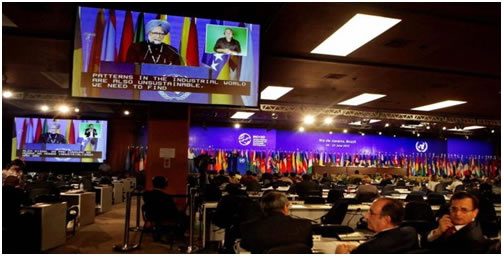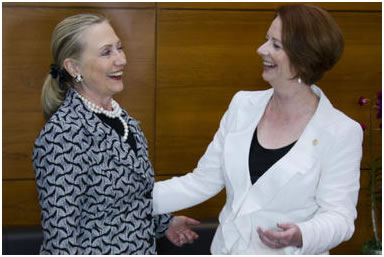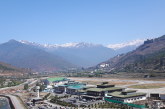By Dr Arvind Kumar, President India Water Foundation

The UN Conference on Sustainable Development held at Rio de Janeiro (Brazil) on 20-22 June 2012, also called Rio+20, was perhaps the biggest summit the UN had ever organized. According to broad estimates, some 40,000 environmentalists and 10,000 government officials gathered with politicians from 190 nations for a meeting which the UN Secretary-General Ban Ki-moon said was “too important to fail”. The Rio+20 summit was so named because it took place 20 years after the landmark Rio de Janeiro Earth Summit of 1992
The US president, Barack Obama, German Chancellor Angela Merkel and British Prime Minister David Cameron did not turn up in Rio+20. They perhaps knew that the summit’s final agreement would be big on woolly feel-good phrases and utterly denuded of the dates and measurable targets to make it meaningful.
There have been mixed responses to Rio+20 summit. It reportedly ended with an unambitious, non-binding statement which made few advances on what was agreed 20 years ago. Activists such as Greenpeace International
called it “an epic failure”. Technocrats such as Maurice Strong, who ran the 1992 summit, called it a “weak” collection of “pious generalities”. Politicians such as Nick Clegg called it “insipid”.

According to one opinion, it was perhaps naïve to expect better. All the indications had pointed to a lack of political will for real change. Ironically, only three of the world’s 90 most important green goals had seen significant progress over the past two decades, and these inter alia include: repairing ozone levels, removing lead from petrol and providing clean drinking water in the world’s urban areas. Little has been achieved on food shortages, ocean pollution, fish stocks or desertification. Species are being wiped out coupled with the destruction of rain forests at an unprecedented rate.
Reports indicate that the Rio+20 summit concluded with only modest and nonbinding goals, and in the eyes of some critics it even took a giant step backwards – by eliminating from its final document any reference to women’s “reproductive rights” of the kind that has figured in similar summits’ statements for the past two decades.
US Secretary of State Hillary Rodham Clinton, who attended the summit’s closing session on 22 June reportedly lambasted global leaders over the retreat on women’s rights as she underscored the US commitment to “reproductive rights.” Clinton received enthusiastic applause when she said, “Women must be empowered to make decisions about whether and when to have children,” and then added that the US “will continue to work to ensure that those rights are respected in international agreements.”

Despite all its limitations, Rio+20 cannot be termed as a total damp squib. The signposts to a greener future were to be found not in the conference hall but in more than 3,000 fringe events. Many of these were innovators focused on small-scale technology solutions. Others were private companies, big and small, that see sustainable development not as some corporate social responsibility PR stunt but as integral to enhancing their productivity and competitiveness.
The head of Unilever was there lobbying for a common set of sustainability goals. The insurance giant Aviva was pushing for it to be made mandatory for companies to report on their green activities. Asda, Philips and PepsiCo backed compulsory publication of carbon emissions. A new generation of business leaders is connecting company success with social and environmental issues that were previously the concern only of NGOs.
Business people and activists have been presented with an important new task by Rio+20. Two developing countries, Guatemala and Colombia, came up with a new idea – a set of new sustainable development goals (SDGs) as successors to the millennium development goals which expire in 2015. The Millennium Development Goals aimed to halve world poverty with specific targets on education, health and child mortality. They will not be fully achieved by 2015 but they have proved very useful yardsticks.
The underwhelming Rio+20 agreement did agree to proceed towards SDGs but avoided any attempt to define them. The challenge for eco-activists now is to do that in a way which creates specific mechanisms for the transition to a greener world economy. Universally accepted SDGs were one of the things the head of Unilever, Paul Polman, was lobbying for in Rio.
This time there has not been much talk about “North-South cooperation.” The emphasis has appeared to be on “South-South’ or even triangular cooperation. The rich nations have taken a stand that the additional finances will have to come through South-South collaboration, Foreign Direct Investment and the markets.
Protests
Protest groups, some in catchy headgear and colourful costumes, who had spread their wares at Flamengo Park and Athlete’s Park, a few km from Riocentro, the venue of main events, tried every trick including media conferences and demonstrations to highlight their viewpoints.
Many of them used vividly dressed children to communicate their angst over the “destruction” of the earth. Brazilian authorities appeared to be liberal in allowing the child protesters to go as far as the media pavilion of the conference venue. Many of the NGOs present at the Rio+20 complained of not being consulted on the official document.

Some of them, like Waek Hamidan from Climate Action Network Europe and Barbara Stocking of Oxfam, felt that the reference to “civil society” in the document text as part of its drafting process should be deleted as they were consulted on the official document only at the last minute.
Observers say that Rio+20 may pass into history as “emblematic of the vast gulf between the cries in the streets and the uninspired language of the conferences’ final outcome.”
“The summit has gone the Copenhagen way, with lot of fuss and no concrete outcome. This place was virtually invaded by the representatives of the corporate world — the drivers of today’s unsustainable human consumption,” noted Soumya Dutta, environmental activist from India.
Indian Stance
The Indian stance at Rio+20 has reportedly been lukewarm. India’s Minister for Environment and Forests Jayanti Nataraj told the media on 21 June: “We remain disappointed with the weak political will in developed countries to provide enhanced means of implementation to developing countries. We are glad that we have agreed to set up two important mechanisms, one for Technology Transfer and another for Finance. Both were Indian proposals.”
India’s Prime Minister Dr Manmohan Singh in his address to the Plenary of the Rio+20 on 21 June de-monished the West for living high life and not paying for it.
While rapping the West for not paying its dues, Dr Manmohan Singh said: “Many countries could do more if additional finance and technology were available. Unfortunately, there is little evidence of support from the industrialized countries in these areas. The ongoing economic crisis has made matters worse.” The reference was clear – the West did not pay when it had the money, so now that it doesn’t how will it do so?
His speech in many was a reiteration of the long established Indian stand, namely, that development, social inclusion and environmental sustainability are all equally critical. “The task before us is to give practical shape and content to this architecture in a manner that allows each country to develop according to its own national priorities and circumstances.”
India was doing its bit, he told the gathering. Between 1994 and 2007, India’s emissions-to-GDP intensity, excluding agriculture, declined nearly 25 per cent. “Looking ahead, we have set a target to further reduce the emissions intensity of GDP by 20-25% between 2005 and 2020,” he said.
Conclusion
Undoubtedly, the Rio+20 summit had heightened the expectations of the developing countries which it failed to deliver. It could be said to be a victory in principles and standstill in practice. However, one is inclined to agree with Simon Romero and John Broder of New York Times that even if the meeting laid out no enforceable goals or specific road maps, it perhaps signaled “a new assertiveness by developing nations in international forums and the growing capacity of grass-roots organizations and corporations to mold effective environmental action without the blessing of governments.”
According to Ms. Earle, the National Geographic explorer, the summit meeting had again put a spotlight, if only briefly, on environmental issues that have perhaps been overlooked, diminished or pushed aside due to the world economic malaise and calls for government austerity. Politicians have a history of being followers rather than leaders in such matters. There is a need for bottom-up mass movement of individuals to get real progress on saving the planet.We should not forget Mahatma Gandhi’s solemn warning: “Earth provides enough to satisfy every man’s need but not every man’s greed.”



